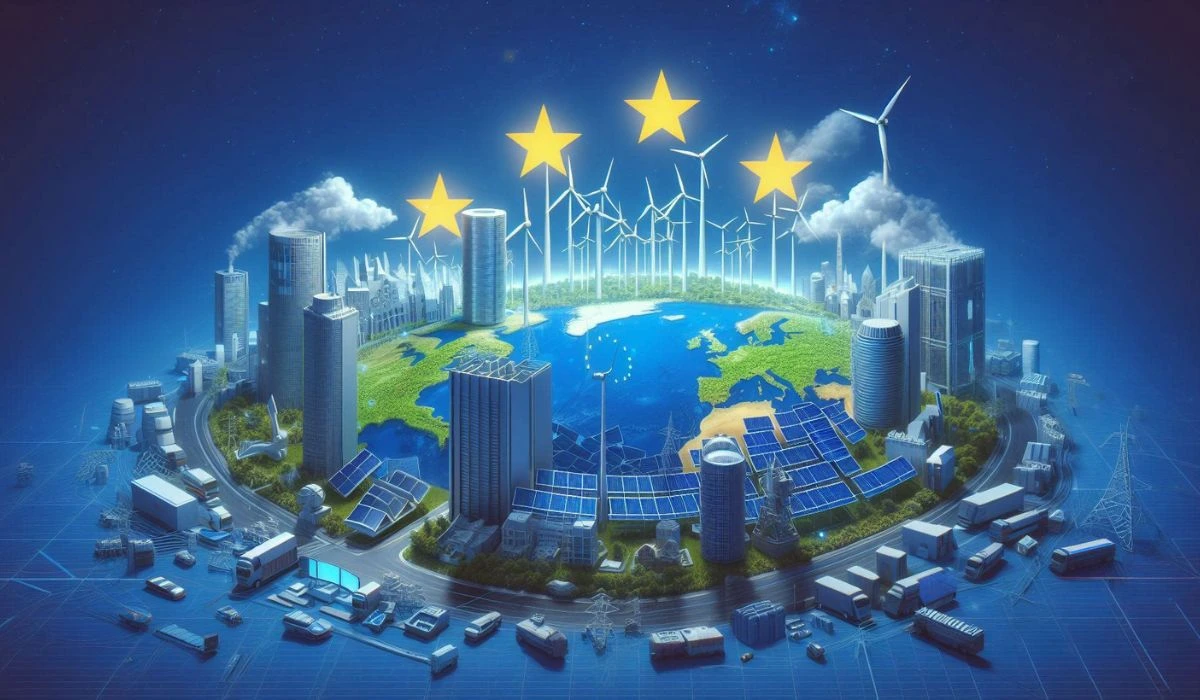As the urgency to tackle climate change grows, sustainability has emerged as a defining theme in the global business landscape. Within the European Union, the push for a greener digital economy is particularly strong. Policymakers, businesses, and consumers are collectively driving the adoption of sustainable practices that are shaping innovation and transforming the EU digital market.
In this post, we’ll explore how green tech and sustainability are influencing digital trends in the EU, the role of regulatory frameworks, and how businesses can leverage this shift to enhance both competitiveness and environmental responsibility.

1. The EU’s Commitment to a Sustainable Digital Future

The EU has long been a global leader in sustainability, and the Green Deal initiative is a testament to its commitment to becoming the world’s first climate-neutral continent by 2050. Digital innovation is seen as a critical component in achieving these ambitious goals. With initiatives like the European Green Digital Coalition and investments in green technology through Horizon Europe, the EU is prioritizing sustainable tech solutions that can contribute to reducing carbon emissions across industries.
Key EU strategies include:
- Promoting Energy Efficiency in Data Centers: The EU’s green digital strategy targets energy consumption, particularly in data centers, which are responsible for a growing share of energy use. By 2030, the EU aims for all data centers to be climate-neutral and energy-efficient, following the Climate Neutral Data Centre Pact.
- Boosting the Circular Economy: Through the Circular Economy Action Plan, the EU is encouraging the adoption of circular design principles. This includes creating longer-lasting tech products, promoting the repair and reuse of digital devices, and minimizing e-waste.
- Supporting Sustainable Cloud and AI Solutions: The EU is advocating for energy-efficient AI models and sustainable cloud solutions to lower the carbon footprint of digital services.
2. The Impact of Green Tech on Digital Market Innovation

Green technology is transforming the digital market in several key areas, pushing companies to rethink how they design products, deliver services, and manage their supply chains:

Energy-Efficient Computing: Innovations in energy-efficient chips, low-power computing, and green software development are gaining momentum. Companies are investing in optimizing software to reduce energy consumption, while hardware manufacturers are exploring new materials and designs to limit environmental impact.

Sustainable Digital Infrastructure: Cloud providers and telecommunications companies are embracing renewable energy sources and designing eco-friendly infrastructure. Major players are committing to reducing their data centers’ carbon footprint through initiatives like Google’s 24/7 carbon-free energy project and Microsoft’s commitment to being carbon-negative by 2030.

Greener Supply Chains: Tech companies are increasingly focusing on sustainable sourcing of materials, ensuring their supply chains support environmental and social responsibility. This is driving demand for traceability technologies like blockchain and IoT to monitor and optimize resource usage.
3. Regulatory Drivers for Green Tech Adoption
:max_bytes(150000):strip_icc()/green_tech.asp-final-ee05c6f7c21049238f5cc85c0d85ee4d.png)
The EU’s comprehensive regulatory framework is accelerating the adoption of green technology across the digital sector. Some of the key regulations include:
- The European Green Deal: Launched in 2019, the Green Deal outlines the EU’s strategy for achieving a sustainable economy, integrating digital solutions to enhance sustainability across sectors.
- Digital Services and Markets Acts: The Digital Services Act (DSA) and Digital Markets Act (DMA) emphasize responsible data management and fair competition, indirectly encouraging companies to adopt sustainable business practices.
- Upcoming AI Regulations: The EU’s proposed AI Act aims to ensure that AI systems are developed and used in a way that is not only ethical but also energy-efficient and environmentally sound.
These regulations are setting new standards for sustainability in the digital space, urging companies to align with the EU’s environmental objectives or risk falling behind.
4. Business Opportunities in the Green Digital Transformation

For businesses, sustainability is no longer just a matter of compliance—it’s an opportunity. Companies that embrace green technology are not only contributing to environmental goals but also gaining a competitive edge in the marketplace. Some of the business benefits include:
- Access to New Markets and Funding: Green technology initiatives open doors to new market segments and funding opportunities, particularly from EU-sponsored programs like Horizon Europe and the Innovation Fund, which prioritize sustainable innovation.
- Enhanced Brand Reputation and Customer Loyalty: Consumers and B2B clients in the EU are increasingly making purchasing decisions based on sustainability. Companies that prioritize green practices can strengthen their brand image and build deeper connections with environmentally conscious customers.
- Cost Savings and Efficiency Gains: Implementing sustainable practices often leads to long-term cost savings through improved energy efficiency, reduced waste, and optimized resource management.
5. Preparing for a Sustainable Digital Future

To successfully navigate the shift toward sustainability in the EU digital market, businesses should consider:
- Investing in Green Technologies: Prioritize investments in energy-efficient infrastructure, sustainable product design, and eco-friendly supply chain practices.
- Adapting to Regulatory Changes: Stay ahead of evolving EU regulations by building compliance into the core of your digital strategy, focusing on areas like data management, product design, and supply chain transparency.
- Collaborating Across the Ecosystem: Partner with other stakeholders, from tech companies and startups to research institutions and NGOs, to co-create sustainable solutions and share best practices.
Conclusion
The push for a greener digital market in the EU is not just a regulatory trend but a strategic imperative that is reshaping the digital landscape. By embracing sustainability, businesses can contribute to environmental goals while unlocking new avenues for growth and innovation. As the EU continues to refine its regulatory framework and prioritize green technology, the opportunities for digital transformation through sustainability are only set to expand.
Navigating these changes requires a proactive approach—but for those that succeed, the rewards will go far beyond compliance, creating value for businesses, society, and the planet.

